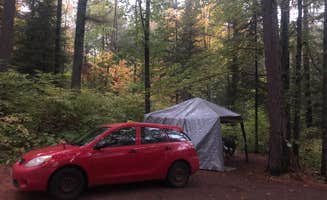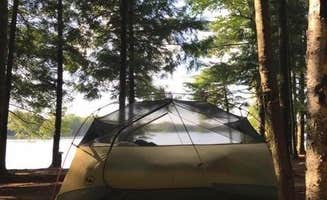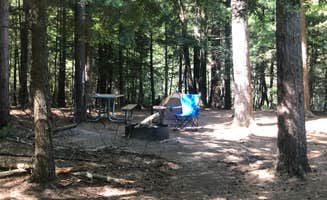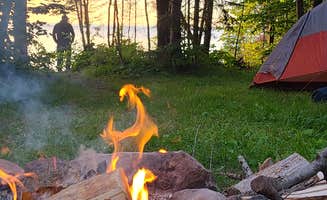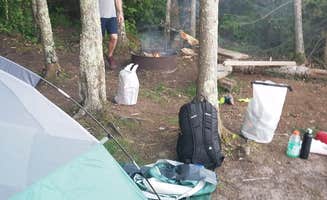Tent camping near Mellen, Wisconsin provides direct access to over 1.5 million acres of the Chequamegon-Nicolet National Forest. The region contains 600+ lakes and 800 miles of streams spread across rolling hills formed by glacial deposits. Summer temperatures typically range from 75-85°F during the day, dropping to 50-60°F at night, with July and August being peak camping months when sites fill quickly.
What to do
Hiking remote trails: Multiple hiking paths at Wabasso Lake Recreation Area take you through hundred-year-old forest roads. According to Dennis L., "There is a nearby Headwaters Lakes Natural Area with a hundred year old road that hikers will enjoy. It takes you back a mile or longer into the forest, between Wabasso and Emily Lakes."
Canoe camping: The Turtle-Flambeau Flowage offers extensive waterways for paddling between campsites. Kurt S. notes about Oak Island: "Long hike to get to The Overlook. Bring a sandwich and water. Hike light." Pack light snacks and water when exploring the islands.
Fishing opportunities: Fish multiple lakes for walleye, musky, and northern pike, especially early mornings and evenings when fish are most active. Jay W. mentions, "Take a canoe down the Turtle Flambeu Flowage and you will be surprised at how many campsites are available but also you will notice most times it's like having an Island to yourself."
Wildlife observation: Dawn and dusk offer prime wildlife viewing times when animals are most active. As one camper at Turtle Flambeau Scenic Waters Area observed: "Wildlife is abundant with Bald Eagles, Loons, deer, coyotes, and sounds of wolves."
What campers like
Island seclusion: Private island camping creates a unique wilderness experience away from crowds. Kim at Turtle Flambeau shares: "We settled on this amazing site called 'Zelda's' nestled in a bay which is off the main drag of boats. It was quiet, heavily wooded, secluded and perfect for two. This site (like many) was on its own private island."
Uncrowded waterways: Even during peak season, many water routes remain relatively uncrowded. According to Jeanne G., "Beautiful Up North Wisconsin! Over 300 islands, camp sites for groups, families and even a quiet area. Availability for gas, bait or a drink and meal."
Natural swimming areas: Many sites offer access to sandy beaches and swim spots. One visitor to Point Detour Wilderness Campground reported: "Our site had a short trail directly to Lake Superior."
Rustic facilities: The minimalist amenities encourage a genuine wilderness experience. Amy G. notes: "All the spaces were mowed and ready for campers except for one that was so far back in the woods that someone seemed to have missed it. No biggie. Plenty of other spaces. All were very unique, no two were the same."
What you should know
Boat access requirements: Many prime camping spots require water transport. As noted by a camper at Stockton Island: "Access to the islands is by water shuttle or via your own watercraft. The islands are famous for a wilderness experience in a pristine part of Lake Superior offshore from Bayfield Wisconsin."
Limited cell service: Most camping areas have no cellular coverage. Jay W. advises: "I wouldn't count on your phone for service."
Restroom facilities: Be prepared for very basic toilet facilities. A camper explains: "All sites have a pit toilet but be aware they are not covered and your literally sitting on a toilet seat in the middle of the woods."
First-come, first-served: Many sites can't be reserved in advance, especially on islands. Arctic D. mentions about Phipps Landing: "Sites are N74.5 and group site is N73.6. Bring your own water or filtration. No rubbish bins. Camping is free, FCFS."
Tips for camping with families
Pack extra supplies: Most locations require bringing all necessities. Janet R. advises about Newman Lake Shelter: "If you're looking for a place to rest and play for the day this is a good choice. I grew up in this region and this little spot is a hidden gem for day camping, fishing, picnicking, and swimming."
Consider accessibility needs: Some areas have accessible options for diverse mobility requirements. A camper notes: "A stellar handicapped accessible platform campsite is adjacent to the ranger station, the best and most accessible I've ever seen and would be perfect for a family member of mine with special needs and mobility issues."
Choose locations with bathroom facilities: Not all sites have restrooms, which can be challenging for younger children. Paul H. points out about Phipps Landing: "3 established tent sites 1 is more secluded than the others. Pit toilets. A little road noise from nearby highway."
Prepare for insects: Bug protection is essential, especially June-July. Kurt S. warns: "Bring head nets and long clothes june-july for bugs."
Tips from RVers
Site size limitations: Most sites accommodate smaller RVs and trailers only. At Big Rock Campground, Lesley R. found: "Great location on a river and was there when no one else was. Stayed two nights and moved to a site further into the woods the second night."
Water access: No hookups available, so arrive with full tanks. One RVer suggests: "There's a great water source in Ashland next to the lake. We would fill our jugs here."
Site security concerns: Some areas have reported break-ins. Janet R. mentions: "Although this is in a beautiful setting with decent campsites, and not far from Ashland for day trips, a concern for me was a notice up about frequent car break-ins and campsite vandalism there."
Consider group camping: Some areas are better suited to camping with others. Janet advises: "Might be a good spot if you wanted to come as a group, though!"


